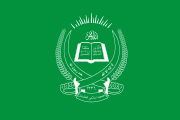Islamic Society جمعیت اسلامی افغانستان | |
|---|---|
 Emblem of Jamiat-e-Islami | |
| Chairman of the Political Bureau | Salahuddin Rabbani |
| Military commander |
|
| Founder | Burhanuddin Rabbani † |
| Founded | 1972 (possibly 1960s) |
| Headquarters | |
| Military wing | Shura-e Nazar (1984–2001) Afghan Armed Forces (1992–1996) Northern Alliance (1996–2001) |
| Ideology | Islamism Islamic democracy Republicanism Communitarism Moderate Progressivism Afghan Tajik interests Anti-Communism Anti-Sovietism Anti-Islamic Extremism Anti-Taliban |
| Political position | Centre-right |
| Religion | Sunni Islam |
| Colours | Green White |
| Seats in the House of the People | 0 / 249
|
| Party Flag | |
 | |
| Website | |
| jamiat-e-islami | |
| Jamiat-e Islami | |
|---|---|
| جمعیت اسلامی افغانستان | |
| Dates of operation |
|
| Country | Afghanistan |
| Group(s) | Primarily Tajiks Minority Uzbeks and Pashtuns |
| Status | Unknown |
| Part of | |
| Allies |
Non-state Allies:
|
| Opponents | State Opponents:
Non-state Opponents:
|
| Battles and wars | |
| Designated as a terrorist group by | |
Jamiat-e-Islami (also rendered as Jamiati Islami; Persian: جمعیت اسلامی افغانستان, lit. 'Islamic Society'), sometimes shortened to Jamiat, is a predominantly Tajik political party and former paramilitary organisation in Afghanistan. It is the oldest and largest functioning political party in Afghanistan, and was originally formed as a student political society at Kabul University. It has a communitarian ideology based on Islamic law. During the Soviet–Afghan War and the following Afghan Civil War against the communist government, Jamiat-e Islami was one of the most powerful of the Afghan mujahideen groups. Burhanuddin Rabbani led the party (including its predecessors) from 1968 to 2011, and served as President of the Islamic State of Afghanistan from 1992 to 2001, in exile from 1996.[1]
- ^ Abasin Zaheer (20 January 2011). "JIA to see leadership changes: Faqiri". Pajhwork Afghan News. Retrieved 17 July 2011.[permanent dead link]mirror